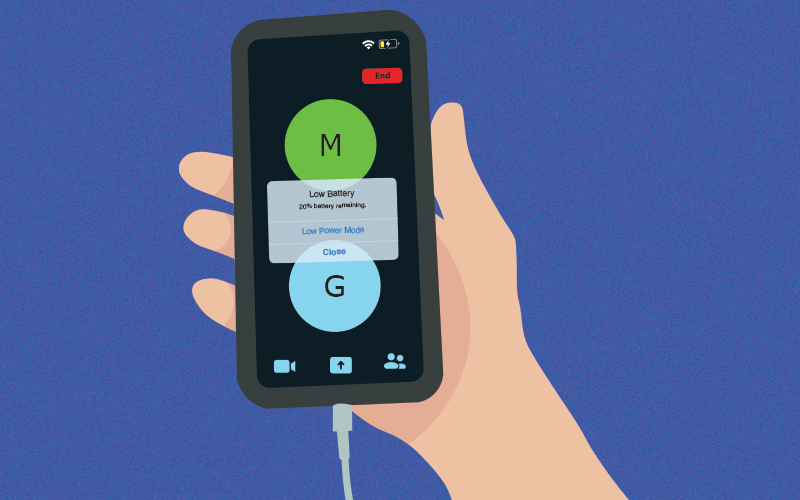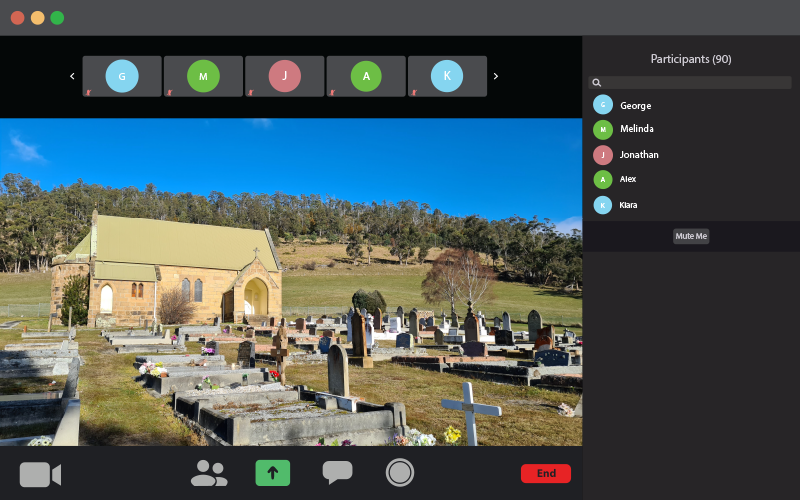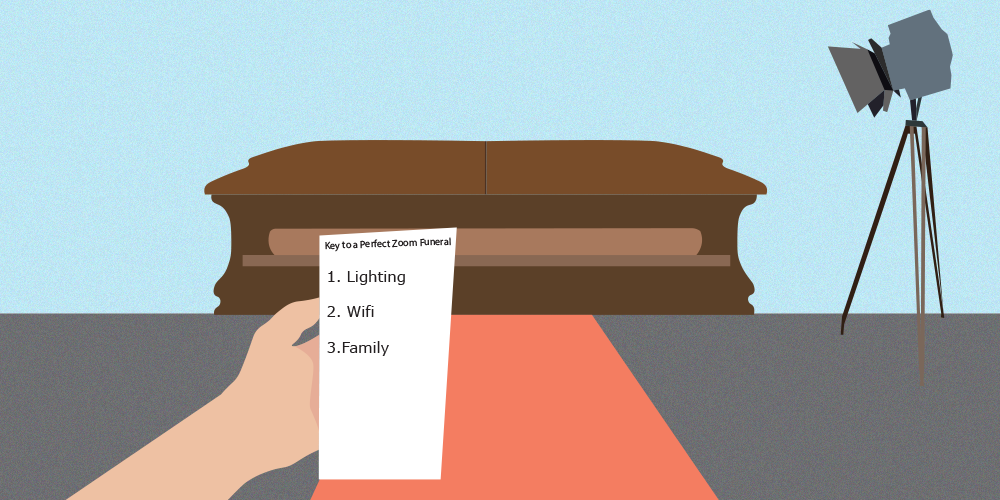The key to filming a funeral over Zoom is the lighting. Everything needs to be graveside now — outside — and sparsely attended, since cemeteries are restricting large groups of people. All that means is that there’s little sun protection out there, and filming into the glare on an already substandard platform is a sure way to ruin the ceremony for your virtual attendees. You need to be aware of the sun at all times. In practice, this means that you’ll need to move around — quietly and respectfully — depending on who is speaking, given that the rabbi invariably stands opposite to the family and friends in attendance.
I have this video on my phone of my maternal grandfather swimming laps in the pool at the age of 88. He’s slow but his form is still really impressive. He hadn’t swum in years, but swimming is one of those things you can’t unlearn. Pure muscle memory. “When I went in and did my first lap, I was very winded,” he says to me as I stand outside the pool, filming our conversation on my phone. “But it seems to be getting better.” That was the last time he ever swam. He was dead two years later.
That’s how we like to tell these stories, I think. If you could have only seen him a year earlier, we say, shaking our heads. Dancing and harmlessly flirting in a tuxedo at a family wedding. Offering his sock as a toy to his great-grandson. Raising his arms in surprise at a 90th birthday sparkler in his chocolate mousse cake. Charming my friends at my law school graduation with stories of his glory days in the local glazier’s union in Paterson, New Jersey. It all happened so fast, we say.
Thirteen people showed up to his graveside service, violating the cemetery’s ten-person emergency policy. When it was my turn to speak, I handed the phone to my brother so he could film. I talked about how my grandfather used to park his Buick LeSabre right behind the backstop when he came to watch my high school baseball games, how he and my grandmother would run into the car for warmth in between innings when it was chilly in the early part of the season, how I used to rub his bald head for good luck before every at-bat. After the service, we drove to a local park and stood around distanced, eating bagels and lox. That night, a family friend apologized for not being able to watch live but commended me for my excellent filming.
•
The key to filming a funeral over Zoom is having your phone properly charged. Maybe that sounds basic, but a half-hour graveside service, combined with some stray minutes at the beginning and end, takes my battery from 95% to 32%, and I was on Low Battery Mode the whole time.

More than three million people have died, but we made it, didn’t we? We, the conquering heroes, the vaccine-card-laminators, the Fauci-abiders, the sanitizers, the double-maskers, the non-essential workers, the online-orderers, the hoarders, the cowards. Everyone who took on more risk than us was reckless and everyone who took on less risk than us was just being annoying.
We’ll celebrate soon, won’t we? We’ll swap war stories and laugh for no reason and it’ll be a bit easier to get into the bars, into ballgames. We’ll delight at how everything’s normal again, how we’re free, how we never realized how good the air smelled, and maybe every now and then we’ll say how we were so lucky and maybe we’ll say more softly how some others weren’t so lucky, and then again maybe we won’t, because maybe summer is beautiful and a time of abundance and maybe we don’t have the vocabulary for all that.
I remember learning about the Black Plague when I was a kid. I went to a fancy, expensive private school. They told us how these people would vomit blood, grow tumors the size of apples in their armpits and groins, develop gangrene that would turn their fingers black and destroy their flesh. They told us how they were powerless, how the plague killed one out of every three people living on the European Continent. Turn to your left, now turn to your right, etc. They told us how the world legitimately felt smaller, emptier. And they told us that out of this annihilation, this mass disappearance, the Renaissance ensued and the patron class prospered.
I didn’t realize it at the time, but they were trying to tell us: You are the Medicis, not the fallen. Follow the path forward and leave the others behind.
•
The key to filming a funeral over Zoom is being attentive. You need to send everyone the link, then send it three more times, then explain what Zoom is to your grandfather’s friends, then be on standby for technical assistance right before the service starts. You need to mute everyone’s microphones, including any stragglers who join after the service begins. And you need to frame the shot to make sure the proceedings are in proper view, meaning you must look not at the Zoom attendees, as you would in a normal call, but at the speaker. When your dad is fighting through tears to eulogize his mother, for example, be sure to stare at your phone and stand far enough away to capture his full frame.

Weeks after my grandmother’s service, my family is in Maryland, all together for the first time in 15 months. We’re all vaccinated, save for my two little nephews, and experiencing the weekend we’ve dreamed about since this all started — the guilt-free, maskless, hugging, linger-around-the-dining-room-table family weekend that, for most of the world, won’t be possible for years. My not-yet-five-year-old nephew is making us run races against him in the backyard. He calls my dad to race and, for the first time, I watch my father run slow and bowlegged — that nagging hip he shrugged off for years instead of getting physical therapy — and wonder when that started.
My grandmother, my father’s mom, was gentle, full of gratitude. Her husband narrowly escaped Nazi Poland as a child with his mother, while his father and brother very likely died in a concentration camp. When I visited Auschwitz-Birkenau, I looked for them, knowing it was fruitless and dumb but hoping I’d spy a stray name on a placard, a memorial. In the middle of the war, the Germans were killing so many Jews at Auschwitz that they struggled to find a way to dispose of all the bodies. They initially buried people in a large field but the graves could not be dug deep enough. The Nazis ultimately developed large cremation units, impressive fire pits that were used to burn bodies en masse, including rotting corpses that they exhumed from the ground. My tour guide knelt down in the soil and emerged with fragments of human bones in his palm, the ruins of anonymous, condemned souls that the earth would not conceal.
When we used to sit around playing Rummikub at their home in central New Jersey, my grandmother would occasionally look across the table at her husband, beaming, and gush about his full head of hair or his handsome face, as if calculating, in real-time, the infinitesimal possibility of his life, of their life together.
She taught me how to tie my shoes and play poker. On sleepovers, she and my grandfather would take us for Chinese food at night and IHOP in the morning, and she’d laugh and coo at every child that came past, oh how precious. I’d ask her if we could get spare ribs or chocolate chip pancakes and she’d smile and caress my head, whatever you like, bubeleh, whatever you like.
Her Alzheimer’s was really bad the last time I saw her, a weekend a couple of years ago with my father. The disease had, of course, taken her memory — she had no idea who my father or I were — as well as her ability to speak with any coherence. But it also changed her personality; she had become irritable, sometimes downright nasty. It is a stunning feeling — perhaps you know it — to see this person who looks like your loved one but isn’t, to wonder where the bodysnatchers have taken her. When we left I knew it was the last time but I didn’t care. I just needed to get out of there.
Out in the backyard in Maryland, my not-yet-five-year-old nephew calls on me to race. He’s very competitive these days and, on the rare occasion someone doesn’t let him win at something, he’ll whine and protest and claim the game wasn’t fair. As my father calls out on your marks, I suddenly have this urge to run full speed and beat my nephew, destroy him really, and when he starts complaining I will cut him off and tell him that you lost, get it together man, you’re going to lose, so you better learn now, because you’re going to lose everything, lose all the time, and sometimes you’ll see it coming and sometimes you won’t, but there’s nothing you can do about it, and that’s all society is, an elaborate way for us to figure out which losses we care about and which we don’t.
But he’s not-yet-five and I’m not yet a complete psychopath, so I jog and we all jog and he wins, he wins every race, and he runs into the house for lunch a winner, laughing and screaming with joy, without ever looking back. •




